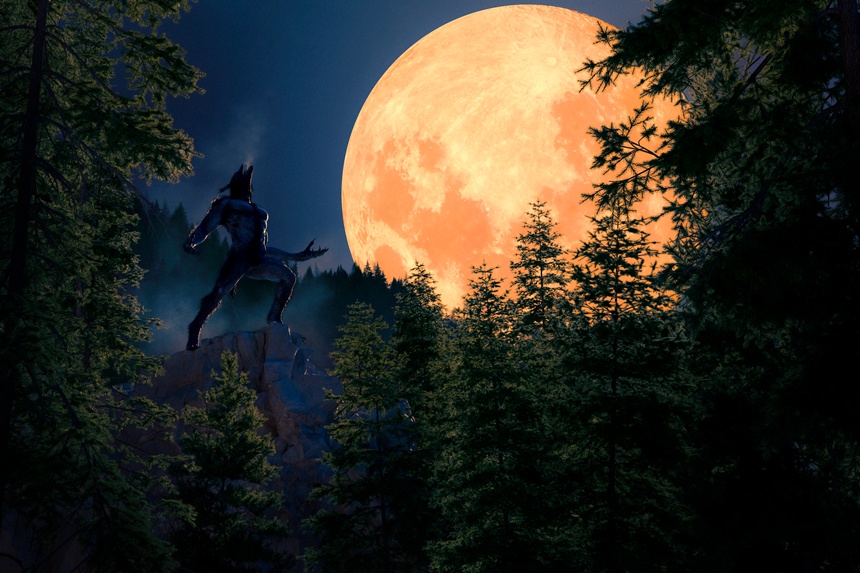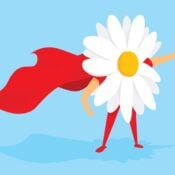As Dean Martin crooned in the iconic 1987 film Moonstruck, “When the moon hits your eye like a bigga pizza pie, that’s insomnia.” Wait, no – he sings “…that’s amore,” not insomnia. But it turns out that how long you sleep goes way down during the full moon, whether or not it hits your eye. And to some extent, the moon might even influence how we feel as well.
Studies on how the lunar cycle impacts our sleep used to rely on test participants reporting how well and how much they slept. This was a major flaw, as it’s tough to rate one’s sleep quality when one is unconscious the whole time. It’s no surprise that results were all over the map.
However, the advent of “smart watches” changed that. In 2021, scientists from the National University of Quilmes in Argentina, the University of Washington, and Yale University joined forces on the largest, most in-depth study on lunar cycles and sleep ever done. Thanks to wrist monitors that recorded heart rate, brain activity, and other factors, it was the most accurate, too. The verdict? Earth’s only natural satellite appears to have a big effect on sleep.
To reach this conclusion, researchers evaluated the sleep of 98 people for several months in three Argentine villages. One village had a modern electric grid, while another had a crude system where each house had just one or two lights. A third settlement was very remote and had no electricity at all. In every case, participants’ sleep changed with each lunar cycle.
Although the effect was greatest in the village with no power, it was significant in well-lighted homes, too. On average, participants fell asleep 30 minutes later and woke about 15 minutes earlier during the three nights prior to a full moon. In the village with no power at all, participants slept a whole hour less on each of the pre-full moon nights.
The scientists said that the changes they saw might be an ancient adaptation for making use of additional hours of light during each full moon. Regardless, they say that this phenomenon must be taken into account in all sleep studies going forward, a very important point.
But moonlight isn’t the only thing that varies with each lunar cycle – the moon’s gravitational pull is enough to slosh our planet’s oceans around, creating the tides. Being that we are “…giant bags of mostly water,” as an alien life-form once described humans on a Star Trek episode, it seems logical to conclude that the moon tugs at us in some way. Exactly how and to what degree, though, remains an open question.
The idea that the moon can tweak our emotions goes back a long way; indeed, the term lunacy was coined in the 16th century to describe this very effect. These days we know this word is offensive, though until being banned in 2012, it was on the books in a number of federal laws in the United States Code. It might not be called lunacy, but some there’s a rise in “crazy behavior” leading to hospital admissions and arrests around the full moon.
Although science has yet to find a clear link between moon and mood across the board, there is evidence that the moon’s position does affect people with bipolar disorder. In 2018, Dr. Thomas A. Wehr, a scientist at the National Institutes for Mental Health, released the results of a two-year study on potential lunar effects on bipolar illness involving 17 patients with the disease.
Dr. Wehr found a distinct pattern of these patients rapidly switching between the manic and depressive stages of bipolar illness at certain lunar phases. The most significant changes precisely corresponded to the “supermoon,” when a full moon happens within 24 hours of when it comes closest to us in its monthly orbit. Although he doesn’t claim the moon caused the mood oscillations he saw, Dr. Wehr did say the data suggest a possible biological pathway through which lunar gravitational pull might affect moods.
A lesser-known lunar effect happens through tidal movement. When salt water passes back and forth across the face of our planet, small but measurable electric currents are created. Indirectly, this could have an impact because electrical fields are proven to alter human brain function. In 2019, a research team from the University of Tokyo and the California Institute of Technology showed that humans can detect natural geomagnetic currents. They found that even minute electrical fields can reduce human alpha-wave brain activity (alpha waves are associated with relaxed or meditative states).
Knowing that we all lose sleep as the full moon approaches, we should try to exercise a lot more patience in the way we conduct our relationships, motor vehicles, and other things that have a high hazard potential should something go awry.
Become a Saturday Evening Post member and enjoy unlimited access. Subscribe now




Comments
Thank you for pointing out the error! It has been corrected.
Great opening moon shot, Paul. There’s a lot of good information here, particularly on electrical currents and brain function per your links. I personally try to get extra sleep as a matter of course anyway, which is always helpful. Also, what’s going on with the moon on a given night or nights, won’t affect me as much.
I thought this was well known and well documented.
“though tidal movement. ”
Should be
“through tidal movement.”